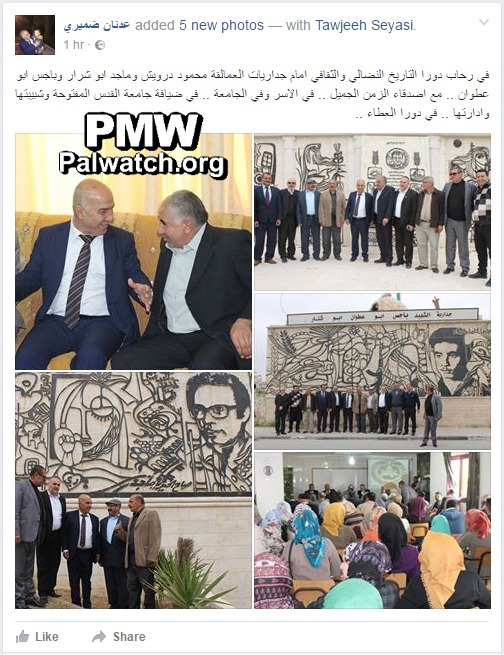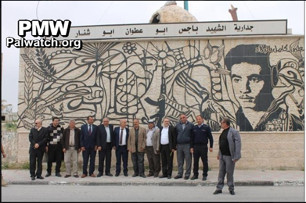Relief commemorating terrorists depicts map of “Palestine” together with gun

Images and text posted on the Facebook page of PA Security Forces Official Spokesman Adnan Al-Damiri
Posted text: “The history of the struggle and culture throughout Dura, in front of the wall reliefs of the giants Mahmoud Darwish (i.e., Palestinian poet), Majed Abu Sharar (i.e., senior Fatah and PLO leader from the 1970s), and Bajes Abu Atwan (i.e., Fatah terrorist killed while fighting against Israel in 1974), with friends from the good times in prison and university, hosted by Al-Quds Open University, its [Fatah student movement] Shabiba, and its administration.”
The following image shows a wall relief of Bajes Abu Atwan. In the center of the relief appears the PA map of “Palestine” that presents all of Israel as “Palestine” together with the PA areas, with the right edge of the map formed by an assault rifle.
Text above relief: “Wall relief of Martyr (Shahid) Bajes Abu Atwan ‘Abu Shanar’:”
Posted text: “The history of the struggle and culture throughout Dura, in front of the wall reliefs of the giants Mahmoud Darwish (i.e., Palestinian poet), Majed Abu Sharar (i.e., senior Fatah and PLO leader from the 1970s), and Bajes Abu Atwan (i.e., Fatah terrorist killed while fighting against Israel in 1974), with friends from the good times in prison and university, hosted by Al-Quds Open University, its [Fatah student movement] Shabiba, and its administration.”
The following image shows a wall relief of Bajes Abu Atwan. In the center of the relief appears the PA map of “Palestine” that presents all of Israel as “Palestine” together with the PA areas, with the right edge of the map formed by an assault rifle.
Text above relief: “Wall relief of Martyr (Shahid) Bajes Abu Atwan ‘Abu Shanar’:”

Mahmoud Darwish is considered the Palestinian national poet. He published over 30 volumes of poetry and 8 books of prose and has won numerous awards. He joined the Israeli Communist Party in 1961 and the terrorist organization PLO in 1973, becoming a member of the PLO Executive Committee in 1987. He left the PLO in 1993 because it signed the Oslo Accords with Israel.
Many in Israel see his poetry as inciting hate and violence. One poem he wrote in 1988 at the height of the Palestinian wave of violence and terror against Israel (the first Intifada, 1987-1993) calls to Israelis: “Take your portion of our blood - and be gone… Live wherever you like, but do not live among us… Die wherever you like, but do not die among us… Leave our country, our land, our sea, our wheat, our salt, our wounds, everything, and leave the memories of memory.”
He also wrote “Silence for the Sake of Gaza” in 1973, which many see as glorifying terror: “She wraps explosives around her waist and blows herself up. It is not a death, and not a suicide. It is Gaza's way of declaring she is worthy of life.”
His defenders have claimed that Israel misinterprets his poetry and that he sought reconciliation with Israel. One wrote in 2017: “Darwish arranged meetings between Palestinian and Israeli intellectuals, and published essays on their discussions. He was optimistic that, through mutual understanding, the two sides could eventually reconcile.” [https://www.bcalnoor.org/]